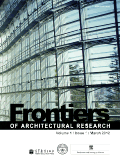
Frontiers of Architectural Research
Scope & Guideline
Shaping the Future of Architecture Through Open Scholarship
Introduction
Aims and Scopes
- Urban Morphology and Design:
The journal focuses on the study of urban forms, spatial configurations, and their impact on human behavior and environmental performance. It emphasizes methodologies that analyze urban dynamics and the interplay between built environments and social interactions. - Sustainability and Environmental Performance:
A core area of research includes sustainable architectural practices, energy efficiency, and the integration of green technologies in building design. The journal supports studies that explore eco-friendly approaches and the role of architecture in mitigating climate change. - Cultural and Historical Contexts:
Research that investigates the relationship between architecture and cultural identity, heritage conservation, and historical context is a significant focus. The journal encourages submissions that analyze architectural styles and their evolution within specific cultural frameworks. - Technological Integration in Architecture:
The journal emphasizes the role of advanced technologies, such as BIM, machine learning, and computational design, in the architectural process. It highlights innovative practices that enhance design efficiency and sustainability. - Social Impacts of Architecture:
Research exploring the social dimensions of architecture, including how built environments influence community dynamics, public health, and well-being, is a prominent aspect of the journal's scope.
Trending and Emerging
- Smart Cities and Digital Integration:
There is a growing focus on the intersection of architecture and smart technologies, including the use of IoT, data analytics, and digital fabrication in urban design. This trend reflects a shift towards creating responsive and adaptive urban environments. - Biophilic Design and Well-being:
Research on biophilic design principles that enhance human well-being through natural elements in architecture is on the rise. This reflects a broader recognition of the importance of connecting built environments with nature. - Post-Pandemic Urban Resilience:
Emerging themes related to urban resilience and adaptability in response to the COVID-19 pandemic are becoming increasingly prominent. The journal is publishing studies that explore how architecture can contribute to healthier and more resilient urban spaces. - Interdisciplinary Approaches to Architecture:
There is an increasing trend towards interdisciplinary research that combines insights from fields such as neuroscience, sociology, and environmental science to inform architectural practices. This reflects a holistic understanding of the built environment's impact on society. - Sustainable Materials and Construction Practices:
Research focusing on the use of sustainable materials and innovative construction practices is gaining traction. This includes studies on the lifecycle impacts of materials and the potential for reducing carbon footprints in the construction industry.
Declining or Waning
- Traditional Architectural Techniques:
There has been a noticeable decrease in studies focusing solely on traditional building methods and materials. While important, this area seems to be overshadowed by more contemporary approaches that incorporate modern technologies and sustainability. - Historical Preservation without Modern Integration:
Research that addresses historical preservation in isolation from modern architectural practices is declining. There is a growing emphasis on integrating heritage conservation with contemporary design solutions. - Theoretical Frameworks without Empirical Applications:
Papers that propose theoretical frameworks without empirical validation or case studies are becoming less common. The journal is increasingly favoring research that combines theory with practical applications and real-world case studies.
Similar Journals
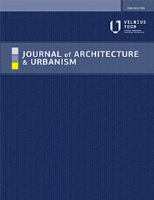
Journal of Architecture and Urbanism
Connecting Theory and Practice in ArchitectureThe Journal of Architecture and Urbanism, published by VILNIUS GEDIMINAS TECH UNIV, stands as a pivotal resource for scholars and practitioners in the fields of architecture and urban studies. Since its inception in 2012, the journal has committed to advancing research and discourse on the design, planning, and functionality of urban environments, reflecting a dedicated focus on contemporary challenges in architecture and urbanism. With an impressive open access model implemented since 2018, it ensures that innovative research is accessible to a global audience, fostering collaboration and knowledge exchange. The journal boasts a commendable reputation, categorized in the Q2 quartile for Architecture and Q3 in both Geography, Planning and Development and Urban Studies as of 2023, while maintaining respectable Scopus rankings. Addressing key themes from sustainable design to socio-economic impacts on urban spaces, the journal aims to inspire new models and solutions that meet the evolving needs of growing urban populations. This is a must-read for anyone engaged in the intersection of architecture and urban development.
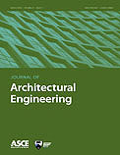
Journal of Architectural Engineering
Connecting Theory and Practice in Architectural EngineeringThe Journal of Architectural Engineering, published by the ASCE (American Society of Civil Engineers), stands as a pivotal resource in the interdisciplinary fields of architecture and engineering. With an ISSN of 1076-0431 and E-ISSN 1943-5568, this journal has garnered a notable reputation since its inception in 1995, currently converging towards 2024. Boasting a Q1 ranking in Architecture and Visual Arts and Performing Arts, alongside respectable Q3 rankings in Building and Construction and Civil and Structural Engineering, the journal places itself in the elite class of scholarly publications, evidenced by its impressive Scopus rankings. Its commitment to providing cutting-edge research ensures comprehensive coverage across various aspects of architectural engineering, facilitating robust interdisciplinary dialogues. Although the journal operates under a traditional access model, its impact on the academic community remains profound, making it an essential platform for researchers, professionals, and students who seek to push the boundaries of knowledge in their respective fields. This journal not only aims to stimulate innovative ideas but also fosters a collaborative environment for advancing sustainable architectural practices in a rapidly evolving built environment.

IN BO-Ricerche e Progetti per il Territorio la Citta e l Architettura
Exploring the intersection of architecture and social dynamics.IN BO-Ricerche e Progetti per il Territorio la Citta e l Architettura, published by the Department of Architecture at the University of Bologna, serves as a crucial conduit for scholarship in the fields of architecture, urban studies, building and construction, and visual arts. With its commitment to open access since 2008, this journal ensures that innovative research is accessible to a broad audience, fostering collaboration and advancement within these disciplines. Although it currently holds a Q4 ranking in various categories, including Architecture and Urban Studies, it plays a pivotal role in contextualizing contemporary challenges faced in urban development and architectural practice, thereby encouraging critical discourse. The journal publishes original research findings, case studies, and theoretical discussions aimed at enhancing the understanding of the interactions between built environments and social dynamics. Engaging researchers, professionals, and students alike, IN BO is dedicated to not only documenting but also shaping the future of urban and architectural landscapes in Italy and beyond.

Journal of Architecture and Planning -King Saud University
Advancing Architectural Excellence and Urban Sustainability.Journal of Architecture and Planning, published by King Saud University Press, serves as a critical platform for scholarly dialogue and innovation within the field of architecture and urban planning. This peer-reviewed journal, bearing the ISSN 1018-3604, aims to disseminate high-quality research that addresses contemporary challenges in architectural design, environmental sustainability, and urban development. Situated in Riyadh, Saudi Arabia, this journal not only highlights regional architectural practices but also fosters global discussions, making it an essential resource for researchers, professionals, and students alike. Although currently not open access, the journal is dedicated to providing extensive coverage of the latest findings and theoretical advancements in architecture and planning, paving the way for impactful contributions that can transform communities and enhance the built environment.

Boletin Academico-Revista de Investigacion y Arquitectura Contemporanea
Empowering Scholars to Transform Architectural Discourse.Boletin Academico-Revista de Investigacion y Arquitectura Contemporanea is a distinguished journal published by SIELAE & UNIV CORUNA, Fac Filologia, focusing on the interconnectivity of contemporary architecture, cultural studies, and visual arts. With an E-ISSN of 2173-6723, this open-access publication serves as an essential resource for researchers, academics, and professionals eager to explore innovative perspectives and methodologies in these dynamic fields. Spanning a commendable period from 2016 to 2023, the journal demonstrates a strong academic footprint, ranked in the Q2 category for both Architecture and Cultural Studies, and holds a prestigious Q1 ranking in Visual Arts and Performing Arts. With Scopus rankings reflecting its growing influence—particularly in Visual Arts and Architecture—Boletin Academico delivers a platform that is not only academically rigorous but also culturally relevant, encouraging discourse that shapes the future of contemporary architectural and artistic practices. The journal’s commitment to open access further enhances its appeal, ensuring that groundbreaking research is readily available to an extensive audience.
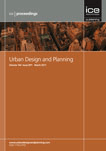
Proceedings of the Institution of Civil Engineers-Urban Design and Planning
Innovating Spaces for Tomorrow's CitiesProceedings of the Institution of Civil Engineers-Urban Design and Planning is a leading scholarly journal published by EMERALD GROUP PUBLISHING LTD, dedicated to advancing knowledge and innovation in the fields of urban design and planning. With an ISSN of 1755-0793 and E-ISSN 1755-0807, this journal serves as a vital platform for researchers, professionals, and students to disseminate impactful studies and findings. It boasts impressive rankings, including Q1 in Architecture and notable positions in Civil and Structural Engineering and Urban Studies, underscoring its significance in the academic community. The journal's scope encompasses a diverse array of topics relevant to urban environments, encouraging interdisciplinary dialogue and exploration. Although it operates under traditional access, its contributions are invaluable, reflecting the latest developments and challenges within urban planning practices. Published regularly since 2009, the Proceedings of the Institution of Civil Engineers-Urban Design and Planning is vital for those seeking to enhance their understanding of sustainable urban development and design methodologies, making it a critical resource in its fields of study.

Frontiers in Built Environment
Fostering collaboration for resilient built environments.Frontiers in Built Environment, published by FRONTIERS MEDIA SA, is a highly regarded open-access journal that has established itself as a significant platform for cutting-edge research in the fields of building and construction, geography, planning and development, and urban studies. Since its inception in 2015, this journal has embraced a commitment to disseminating high-quality, peer-reviewed research, allowing researchers, professionals, and students to access pivotal findings and insights without financial barriers. With an impressive 2023 impact factor, it ranks in the Q1 tier for Urban Studies and is positioned within the Q2 tier for both Building and Construction and Geography, Planning and Development, demonstrating its influence and relevance in evolving urban and environmental challenges. Its rigorous indexing, exemplified by a strong Scopus ranking, reflects its contribution to the advancement of knowledge in these critical areas. With a clear dedication to fostering innovation and collaboration within the built environment sector, Frontiers in Built Environment is essential reading for those engaged in shaping sustainable urban futures.
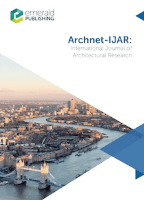
Archnet-IJAR International Journal of Architectural Research
Fostering collaboration in the global architectural community.Archnet-IJAR International Journal of Architectural Research serves as an esteemed platform within the field of architecture and urban studies, published by Emerald Group Publishing Ltd. With an impressive impact reflected through its Q1 category rankings in both Architecture and Urban Studies, this journal highlights cutting-edge research and innovative practices spanning diverse architectural disciplines. The journal focuses on facilitating interdisciplinary dialogues, making it a vital resource for researchers, students, and professionals keen on advancing their understanding of architectural theories and urban design. With its commitment to quality, evidenced by high scores in various Scopus rankings, including a rank of 9th in Visual Arts and Performing Arts, Archnet-IJAR aims to publish work that not only challenges conventional boundaries but also enriches practical applications in the built environment. Its open-access model ensures wider dissemination of knowledge, fostering collaboration and growth within the international architectural community.
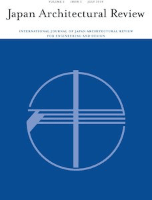
Japan Architectural Review
Fostering collaboration for innovative architectural solutions.Japan Architectural Review is a premier open-access journal published by WILEY, dedicated to advancing the fields of architecture, environmental engineering, and modeling and simulation. Since its inception, this journal has emerged as a critical platform for disseminating innovative research, offering insights into the latest trends and challenges facing the built environment and sustainability practices. With an impact factor reflecting its growing influence, especially in the Q2 category of Architecture and notable rankings in environmental engineering and modeling disciplines, it serves as an essential resource for researchers, professionals, and students alike. The journal's commitment to open access since 2018 has further enhanced its reach, making high-quality research accessible to a global audience. Spanning an important timeline from 2019 to 2024, the Japan Architectural Review facilitates a collaborative discourse among scholars, encouraging innovative solutions to contemporary architectural challenges.

Architect
Bridging Theory and Practice in ArchitectureArchitect is a publication dedicated to the diverse and evolving field of architecture and design, presented by the reputable HANLEY WOOD, LLC. Since its inception in 1975, the journal has traversed critical periods in architecture, offering valuable insights and research that cater to both practitioners and academics alike. The journal holds a Q4 ranking in both Architecture and Visual Arts and Performing Arts, indicating its niche presence within the crowded scholarly landscape. Despite its recent rankings within the Scopus, where it lies in the lower percentiles of the architecture category, the Architect journal provides platforms for innovative discussions and explorations in design, helping to shape the discourse in the architectural community. While the journal is currently accessible via traditional subscription models, it remains a critical resource for those seeking to bridge practice and theory in architecture. As it continues to evolve beyond its historical publication periods, Architect aims to nurture a rich environment for professional growth, scholarship, and dialogue among researchers, designers, and students engaged in the dynamic world of architecture.